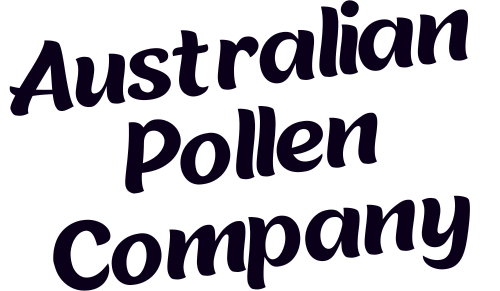Bee pollen is one of nature’s most powerful superfoods, and collecting it is a delicate process that balances ethical beekeeping with sustainable harvesting. In Australia, we use specially designed traps to gather this golden treasure, ensuring the bees remain healthy and thriving. But how exactly is bee pollen collected, and what makes it such a valuable natural product?
The Role of Bees in Pollination
Bees play a vital role in pollination, which is crucial for plant reproduction and food production. As they travel from flower to flower collecting nectar and pollen, they inadvertently fertilise plants, helping them produce fruit and seeds. Pollen is an essential protein source for bees, fuelling their colony and supporting their growth. Ethical beekeepers ensure that bees always have enough pollen for their needs before collecting any excess for human use.
The Basics of Beekeeping
Beekeeping is the practice of maintaining bee hives for honey production, pollination, and the collection of byproducts such as bee pollen, beeswax, and royal jelly. Beekeepers provide a safe environment for their bees, ensuring they have access to food, water, and protection from pests and diseases. A beehive is made up of stacked boxes containing frames where bees build honeycomb to store honey and pollen. The hive operates as a structured society, with a single queen, worker bees, and drones all playing vital roles in colony survival.
How is Bee Pollen Collected?
Bee pollen is harvested using specially designed pollen traps placed at the entrance of the hive. These traps contain small openings that cause the bees to brush against a mesh screen as they enter. This gently removes some of the pollen granules clinging to their hind legs, which then fall into a collection tray below. Importantly, this process does not harm the bees, and beekeepers carefully monitor the hives to ensure the colony retains enough pollen for its own nutritional needs.
Once collected, the pollen is carefully cleaned and dried to preserve its nutritional integrity. The end result is a vibrant, nutrient-rich product that can be used in a variety of ways, from boosting smoothies to sprinkling over yoghurt.
Ethical and Sustainable Beekeeping Practices
Sustainability and ethical beekeeping are at the heart of our operations. We ensure that only surplus pollen is collected, never taking more than what the bees can spare. Our methods are designed to keep bee colonies strong and healthy, supporting their role in pollination and biodiversity.
Beekeeping also contributes to environmental conservation. By maintaining healthy bee populations, we help support natural ecosystems and agricultural industries that rely on pollinators for crop production. Ethical beekeepers work closely with nature, understanding that a thriving hive benefits both bees and humans alike.
The collection of bee pollen is a carefully managed process that requires knowledge, skill, and a deep respect for the bees.
Next time you enjoy a spoonful of bee pollen, you’ll know it’s been collected with care, sustainability, and a commitment to protecting these essential pollinators. Discover our premium selection of ethically sourced bee pollen and experience the benefits of this natural superfood for yourself!

